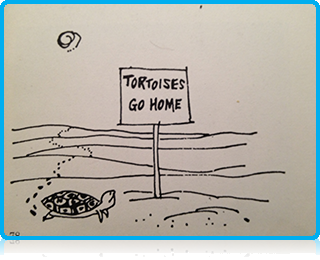A Birds Eye View - Illegals in Holland - possibly a new source of national income, or the cause of a massive increase in costs and paper-work? -
A Birds Eye View - Illegals in Holland - possibly a new source of national income, or the cause of a massive increase in costs and paper-work? -

A Birds Eye View - Illegals in Holland - possibly a new source of national income, or the cause of a massive increase in costs and paper-work? -
The current Dutch government is planning to make being illegal in the Netherlands a criminal offence with fines for all those caught, and prison sentences for those who don't pay on time! The basic idea is that making the notion of being illegal unpleasant will act as a deterrent. The proposals have sparked a wide and critical debate in the Netherlands, with a number of very prominent politicians publicly condemning the motion.
Estimates range from between 100 and 150 thousand illegal residents in the Netherlands, and if many of these were picked up and fined, the national cashbox could benefit a pretty penny .. the trouble is that the saying "there's gold in them there hills" has often proven wrong.
However, it would be flippant to suggest that the Dutch government is proposing to make being 'illegal' a criminal offense just because it sees a gap in the market, no; there are fundamental political reasons to do so - none the least attracting voters from far right, and the traditional working classes.
Essentially, the problems of tackling illegal immigrants in the Netherlands is a European one, in that the Netherlands is part of Schengen, which means that the internal European borders are open for people to travel in and out of the country without being checked. The actual border controls are held far away, in countries such as Poland, Bulgaria, Greece and Romania, who find it difficult to secure all their crossing points with countries outside of the Schengen area. This results in the Netherlands, and other Western European countries, not really knowing how many immigrants without valid papers are residing in their countries at any given moment.
In the Netherlands the police are limited in their powers to stop and interrogate suspected illegal immigrants. They are only allowed to ask a person's name and address in cases where a clear offense has been committed. As Dutch politician Hero Brinkman points out in his column in last Friday's newspaper the Volkskrant, it is well known that illegal immigrants often gather at certain places in the cities of Holland, however cannot be approached by the authorities unless they actually commit an offense.
Brinkman goes on to highlight the problems inherent to illegal immigrants, whether their status is punishable or not (as is the case now). The majority of illegal immigrants are economic migrants who have left poor developing countries in search of a better economic life, a number are also refugees who have not been granted asylum. In both cases society is dealing with the poorest members of society, often without qualifications or schooling, and the idea that any of these people, once discovered, arrested, charged, tried, and eventually fined will ever be able, or actually want to pay the fines imposed by the Dutch courts is probably a politically motivated dream. The cost of these stages of finding and reckoning with illegal immigrants will be borne by the Dutch tax-payer, as will the arrest, trial and sentencing and imprisonment of those offenders who fail to pay their fines.
From Brinkman's article it seems that the only thing to be done with the imprisoned illegal immigrants, once they have done their time, is to release them back onto the streets, as re-patriating them to their home countries is only possible if those nations assist the Netherlands. Of course most don't!
As an international University in this country, we should be concerned about a number of issues that could affect us by these new laws, if they ever come in.. the first is clearly the Netherlands' image as a fair and liberal country, that traditionally deals with its social problems in a pragmatic and business-like way. The proposed solution is neither pragmatic or business-like.
Secondly, we should be concerned about the definition of being an 'illegal immigrant' - many students in the Netherlands have expired residence cards, as a result of not reapplying on time, delays at the IND or even the break caused by switching their study programmes. Until now students have been given the room to restart the process within 3 months, in some cases even longer of their ID card expiring. If police agents are given the new duty to detect and arrest people without a valid residence ID permit, this could cause unpleasant situations for students and increase the burden of work and bureaucracy at the international offices of Dutch Universities.
The problem lies in the fact that populist policies such as are being proposed are focussed on the result of problems caused abroad - poverty and conditions in developing countries, and the inefficiency / inability of Schengen countries to monitor the immigration through its borders. Maybe it's time that European countries wake up to the fact that free movement of people between its member countries brings much more collective responsibility than they first anticipated, in the management of immigration.
Luckily (for us at least), the Netherlands has still one of the most democratically driven political systems in the world, and with a balanced right and left wing coalition in government, there is hope that this motion will not be passed, as the left-wing labour parties members are heavily against the idea… however, politicians tend to choose for a short term solution that leads to immediate voting support!
a BirdsEye View 2013
WUP 11/5/2013
Sources:
de Volkskrant, 10//5/2013
922 words